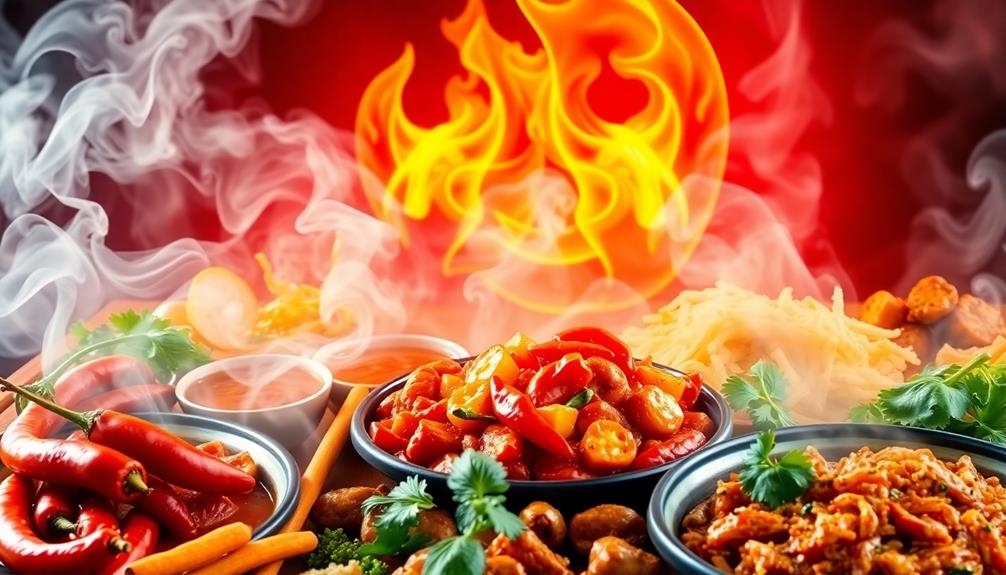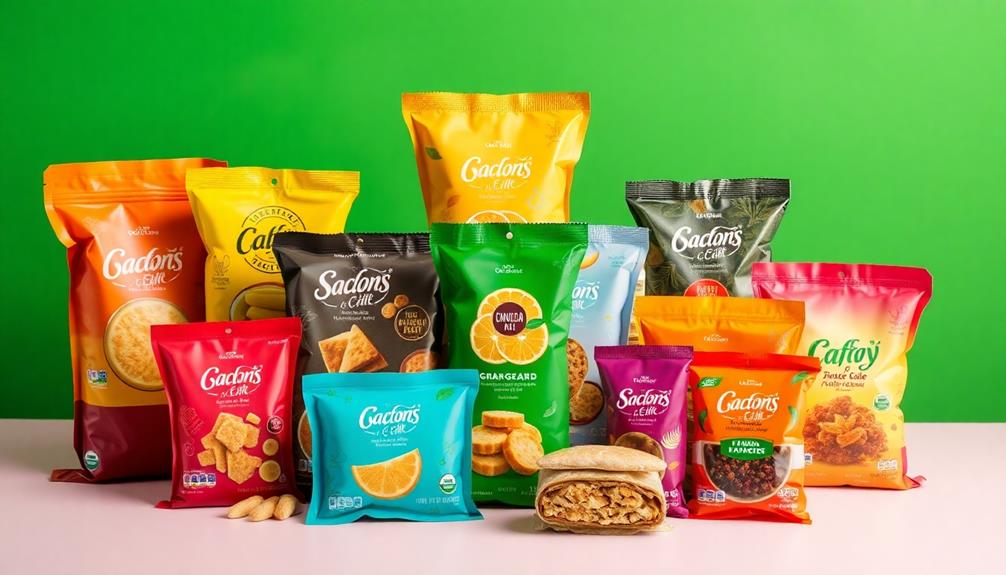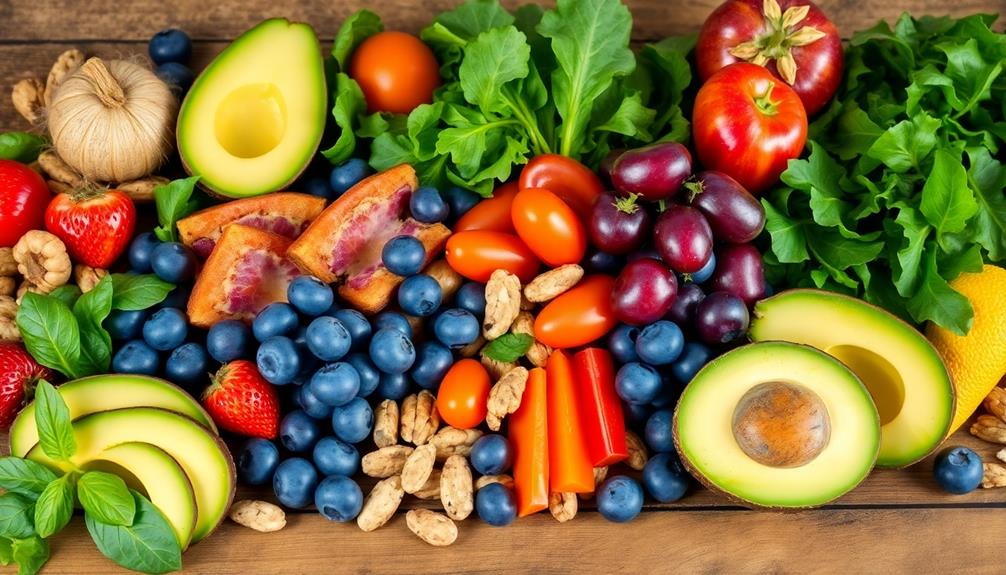Some foods can cause heartburn because they trigger stomach acid to flow back into the esophagus. High-fat foods, like greasy fries, slow digestion and increase pressure on the muscle that keeps acid in your stomach. Spicy foods can irritate the esophagus, while acidic foods, like citrus fruits and tomatoes, can worsen the burning sensation. Large portions and late-night meals can also create problems. To enjoy meals without discomfort, you can try smaller portions and gentler foods. It's all about finding what works best for you, and there's so much more to explore on this tasty journey!
Key Takeaways
- High-fat foods slow digestion and increase pressure on the lower esophageal sphincter (LES), promoting acid reflux.
- Acidic foods lower stomach pH, leading to increased reflux symptoms and heartburn discomfort.
- Spicy foods can irritate the esophagus and stimulate higher stomach acid production, triggering heartburn.
- Large portion sizes elevate pressure on the LES, making heartburn more likely after meals.
- Caffeine and alcohol relax the LES, heightening the risk of acid reflux and heartburn symptoms.
Understanding Heartburn

Heartburn, often described as a fiery sensation in your chest, is a common symptom of gastroesophageal reflux disease (GERD). It happens when stomach acids flow back into your esophagus, causing that uncomfortable burn. Did you know that about 27.8% of adults in the U.S. experience this?
Certain foods, like rich dishes such as Red-Braised Pork Belly, can trigger heartburn due to their high fat content and spices. It can also be triggered by different factors, like certain foods and lifestyle choices.
One key player in this drama is the lower esophageal sphincter (LES). This little muscle acts like a door, keeping stomach acids where they belong. When it relaxes too much, heartburn can strike!
But don't worry; you can manage it with some simple lifestyle changes. Here are a few tips:
- Maintain a healthy weight.
- Eat smaller meals throughout the day.
- Avoid lying down right after eating.
Identifying your food triggers is also super important, as everyone's body reacts differently. By paying attention to what you eat and how you feel, you can make heartburn a thing of the past.
Common Food Triggers

When it comes to heartburn, some common food culprits could be lurking on your plate! High-fat foods, zesty citrus, and spicy dishes can all stir up trouble, making your tummy feel uneasy.
For instance, dishes like Chilaquiles or spicy salsas can be delightful but might exacerbate heartburn symptoms.
Let's explore these tasty treats to see how they can affect your comfort during those delightful family meals!
High-Fat Foods Impact
High-fat foods can greatly impact your digestive health, particularly if you're prone to heartburn. When you munch on greasy items like fries and pizza, you might find those pesky heartburn symptoms creeping in. Did you know that over 50% of people say fried foods trigger their heartburn? That's a lot!
Similarly, certain delicious Brazilian dishes, like Caldeirada, which may be rich in fats and spices, can also contribute to digestive discomfort for some individuals. Consuming such dishes in moderation and pairing them with digestive-friendly ingredients, like ginger or mint, can help alleviate potential discomfort. This approach reflects the principle of using food as medicine across cultures, where culinary traditions often incorporate natural remedies to support health. Exploring these practices not only enhances our appreciation of diverse cuisines but also offers valuable insights into achieving balance and well-being through diet.
High-fat meals can slow down digestion, which means food sticks around longer in your stomach. This puts extra pressure on your lower esophageal sphincter (LES), the little muscle that keeps stomach acid where it belongs. If that muscle relaxes too much, acid can sneak back into your esophagus, making things uncomfortable.
To keep heartburn at bay, it's smart to reduce your intake of high-fat foods. By making this simple change, you can help manage heartburn and even tackle gastroesophageal reflux disease (GERD).
Acidic Food Effects
Many people overlook the impact of acidic foods on heartburn, yet they can greatly contribute to discomfort. If you enjoy citrus fruits like oranges or tangy tomatoes, you might want to be cautious!
These acidic foods can lower the pH in your stomach, making it easier for reflux symptoms to pop up. For instance, enjoying a dish like Hiyashi Chuka during the summer might be invigorating, but be mindful of the sauce that often accompanies it, as it can contain acidic ingredients.
Here are some common heartburn triggers to watch out for:
- Tomatoes: They're delicious, but high acidity can lead to heartburn, especially in sauces.
- Citrus fruits: Oranges and grapefruits might be invigorating, but they can stir up trouble.
- Chocolate: It contains caffeine and fat, which relaxes the lower esophageal sphincter (LES) and allows acid to sneak back up.
- High-fat foods: Fried treats can hang around longer in your stomach, causing your body to produce more acid.
Being mindful of these foods can help you enjoy your meals without the worry of heartburn.
Next time you're preparing a feast, remember to balance those zesty flavors with gentler choices to keep your tummy happy!
Spicy Food Reactions
Spicy foods are notorious for triggering heartburn, affecting more than 50% of people who indulge in them. Many love the kick that chili peppers and spicy sauces bring, but they can stir up trouble for your tummy! Dishes like Chicken Chettinad showcase bold, spicy flavors that can easily irritate sensitive stomachs.
These fiery delights can relax the lower esophageal sphincter (LES), making it easier for acid reflux to rear its ugly head.
Here's what happens:
- Capsaicin, found in spicy foods, can irritate your esophagus.
- You might feel a burning sensation in your chest, known as heartburn symptoms.
- If you have gastroesophageal reflux disease (GERD), spicy dishes can be common troublemakers.
When you enjoy a big plate of spicy goodness, it may increase stomach acid production. This can lead to discomfort, especially if you eat close to bedtime.
High-Fat Foods

High-fat foods can be sneaky troublemakers when it comes to heartburn!
Dishes like fried pork chops and creamy casseroles can be particularly problematic, as they not only delay how fast your stomach empties, but they can also relax the lower esophageal sphincter, making it easier for acid to sneak up.
Increased Acid Production
Often, indulging in rich, fatty foods can lead to increased acid production in your stomach, putting you at a higher risk for heartburn. When you enjoy those crispy fried foods, like Mandazi, and greasy meats, your body gets busy making more bile salts and a hormone called cholecystokinin (CCK). This can make acid reflux more likely, and you definitely don't want that!
High-fat foods take longer to digest, which means they keep your stomach feeling full longer. This extra fullness can put pressure on your lower esophageal sphincter (LES), the little muscle that keeps acid where it belongs. When that pressure builds up, acid might backflow into your esophagus, causing heartburn.
Did you know that over 50% of people with heartburn say fried foods are major triggers for their discomfort? To keep heartburn at bay, consider making some dietary modifications.
Cutting down on high-fat treats can make a big difference! Enjoying lighter meals can lead to a happier tummy, allowing you to savor every bite without worry. So, next time you're tempted by a greasy snack, think about your tummy and make a healthier choice!
Delayed Stomach Emptying
When you indulge in rich, high-fat meals, you might notice that your stomach takes longer to empty, leading to discomfort and an increased risk of heartburn. High-fat foods, like greasy fries and fatty cuts of meat, can really slow things down. For instance, dishes like Slow-Cooked Pork Belly are delicious but can exacerbate this issue.
This delayed stomach emptying puts extra pressure on your lower esophageal sphincter (LES), making it easier for acid reflux to sneak up on you.
Here's why that matters:
- Gastric acid secretion increases after eating high-fat meals, which can add to your discomfort.
- The longer the food stays in your stomach, the fuller you feel. This can lead to overeating, which only adds to the pressure.
- Over 50% of people may find that these delicious meals can trigger heartburn, thanks to the production of bile salts and cholecystokinin (CCK).
If you have GERD or just want to keep heartburn at bay, it's a good idea to limit those high-fat treats. Enjoying lighter meals can help keep your tummy happy and your heartburn away, letting you savor every delightful bite!
Lower Esophageal Sphincter Relaxation
If you've ever enjoyed a rich, creamy dish only to be met with that familiar burning sensation later, you might be experiencing the effects of lower esophageal sphincter (LES) relaxation.
High-fat foods, like fried items and full-fat dairy, can cause this relaxation, making acid reflux and heartburn symptoms more likely. Additionally, indulging in party foods like spooky spider pizzas or creamy dips can also contribute to heartburn issues.
When the LES relaxes, stomach contents can flow back into your esophagus, leading to that uncomfortable burning feeling.
Here are some key points about high-fat foods and LES relaxation:
- What Happens: High-fat meals can stimulate bile salts and cholecystokinin (CCK), which worsen heartburn for over 50% of people.
- Pressure Problems: These foods can slow down how quickly your stomach empties, putting extra pressure on the LES.
- GERD Connection: If you struggle with gastroesophageal reflux disease (GERD), cutting back on high-fat foods might help ease those pesky heartburn symptoms.
Acidic Foods

Acidic foods can be a significant contributor to heartburn symptoms for many individuals. These foods, like oranges, grapefruits, and even tomato sauce, can increase stomach acidity. When you eat them, they can relax the lower esophageal sphincter (LES), allowing acid to sneak back up your throat, causing that uncomfortable burning sensation.
Additionally, holiday meals often include rich dishes and desserts that may also exacerbate heartburn symptoms. For instance, enjoying a slice of pumpkin roll after a festive dinner might be delightful but could lead to discomfort for some.
Here are some common acidic foods to watch out for:
- Citrus fruits: Oranges and lemons are tasty, but they can trigger heartburn.
- Tomato products: Tomato sauce and juices can worsen gastroesophageal reflux disease (GERD) symptoms, leading to more reflux episodes.
- Vinegar: Often found in salad dressings, it can also be a sneaky heartburn culprit.
If you notice heartburn after eating, it might be helpful to limit these acidic foods, especially on an empty stomach. By making small changes, like choosing milder options, you can enjoy your meals without discomfort.
Spicy Foods

Many people love the kick that spicy foods bring to their meals, but these fiery ingredients can also provoke heartburn symptoms. When you enjoy spicy foods, like those with chili peppers, they can stimulate the production of stomach acid. For some, this leads to that uncomfortable burning feeling in the chest.
Spicy foods can also relax the lower esophageal sphincter (LES), which normally keeps stomach acid from flowing back into the esophagus. When the LES isn't working properly, you might feel the effects of gastroesophageal reflux disease (GERD) more intensely.
Here are a few things to keep in mind about spicy foods and heartburn:
- Capsaicin in spicy foods can irritate your esophagus.
- If you eat spicy foods often, you might notice more heartburn.
- Everyone's different, so some people can handle spicy meals just fine, while others may feel immediate discomfort.
Caffeine and Alcohol

When you enjoy your favorite coffee or a revitalizing cocktail, it's important to know how caffeine and alcohol can affect your tummy.
Caffeine can relax the lower esophageal sphincter, making heartburn more likely, while alcohol can do the same, especially if you drink it on an empty stomach.
Luckily, there are plenty of delicious alternative beverages you can try that won't cause those pesky heartburn symptoms!
Caffeine's Impact on LES
Caffeine, known for its stimulating effects, can considerably impact the lower esophageal sphincter (LES) and contribute to heartburn. When you indulge in that morning cup of coffee, you might not realize that caffeine can relax your LES. This relaxation can allow stomach acid to sneak up, causing acid reflux and heartburn.
Here's a quick look at how caffeine affects your tummy:
| Caffeine Effects | Impact on Heartburn |
|---|---|
| Relaxes the LES | Increases likelihood of acid reflux |
| Stimulates stomach acid | Exacerbates heartburn symptoms |
| Regular consumption | Cumulative effect worsens GERD |
Even decaf coffee isn't off the hook! Studies suggest that coffee's acidity plays a role in increasing stomach acid, regardless of caffeine content. If you often experience heartburn, reducing or cutting out caffeine might just be the ticket to feeling better. So, consider swapping that coffee for a soothing herbal tea. Your LES will thank you, and you might find yourself enjoying your meals a whole lot more!
Alcohol's Relaxing Effects
After a long day, you might reach for a glass of wine or a cold beer to unwind, but that drink could be doing more harm than good for your stomach.
Alcohol can relax the lower esophageal sphincter (LES), the valve that keeps stomach acid where it belongs. When this valve relaxes, stomach acid can sneak back into the esophagus, leading to heartburn symptoms.
Did you know that drinking alcohol more than five times a week can double your chances of developing gastroesophageal reflux disease (GERD)?
Both moderate and heavy drinking can make heartburn feel worse, as alcohol stimulates stomach acid production.
Here's the scoop:
- Alcohol relaxes the LES, increasing acid reflux risk.
- Drinking during or right after meals can heighten the chances of heartburn.
- The relaxing effects of alcohol can lead to a higher chance of stomach acid troubles.
Alternative Beverage Options
Many people enjoy their favorite caffeinated or alcoholic beverages, but these drinks can greatly impact heartburn symptoms. If you're looking for alternative beverage options, you're in luck! You can still stay refreshed without triggering discomfort.
- Herbal Teas: Chamomile or ginger tea is a wonderful choice. These soothing drinks can calm your tummy and may help ease heartburn without the caffeine kick.
- Plain Water: This is the best option for hydration. It won't irritate your esophagus or boost stomach acid, so you can sip happily all day long!
- Avoid Carbonated Drinks: Sodas and sparkling water might seem fun, but they can cause bloating and crank up stomach pressure, making heartburn worse.
- Limit Alcohol Consumption: If you enjoy a drink, try to keep it occasional. Remember, drinking too often can relax the lower esophageal sphincter, leading to more reflux.
Choosing the right beverages doesn't mean you have to miss out on fun. With these tasty alternatives, you can enjoy your gatherings without the worry of heartburn ruining your day! Cheers to that!
Portion Size Matters

When it comes to managing heartburn, portion size plays an essential role. Eating large portions can put extra pressure on your lower esophageal sphincter (LES), making heartburn more likely.
Instead, think about enjoying smaller meals throughout the day! Research suggests that eating five to six smaller meals can reduce gastric pressure and help keep heartburn at bay.
Here are some tips to keep in mind:
- Use smaller plates to help control portion sizes.
- Slow down and chew your food thoroughly—this aids digestion!
- Allow at least two hours for digestion before lying down to avoid reflux symptoms.
- Listen to your body; stop eating when you feel satisfied, not stuffed.
Eating Habits Impact

Eating habits have a significant impact on heartburn, and adjusting them can lead to noticeable relief. You mightn't realize how your eating style can affect your tummy!
For instance, if you eat too quickly, it can make digestion harder and push more pressure on your stomach. So, take your time to chew your food well and enjoy every bite!
Here are some helpful tips to keep heartburn at bay:
- Mindful Eating: Try to avoid distractions while eating. Focus on your meal and take it slow. This can help prevent overeating, a common heartburn trigger.
- Meal Size: Instead of having large meals, try eating smaller, more frequent meals throughout the day. This helps keep the pressure on your lower esophageal sphincter (LES) low.
- Timing Matters: Make sure to wait at least two hours after eating before lying down. This can help you dodge heartburn symptoms after meals.
- Food Diary: Keep a journal of what you eat. This can help you spot what triggers your heartburn and find better eating habits!
With these simple changes, you can enjoy your meals while feeling great!
Lifestyle Modifications

Making simple lifestyle modifications can greatly help manage heartburn symptoms. By making a few changes to your daily habits, you can find some relief and enjoy your meals more. Here are some tips to get you started:
- Maintain a healthy weight: Keeping your weight in check reduces pressure on your lower esophageal sphincter (LES), which can help prevent heartburn.
- Engage in regular physical activity: Aim for at least 30 minutes of moderate exercise three times a week. This can boost your digestive health and keep heartburn at bay.
- Practice mindful eating: Focus on your food during meals. Chew thoroughly and avoid distractions, like TV or phones. This helps you enjoy your food and prevents overeating.
- Try chewing gum: After meals, pop in a piece of gum! It can increase saliva production, which helps neutralize stomach acid and soothe your throat.
Identifying Personal Triggers

Identifying personal triggers for heartburn is essential for effective management. Knowing which foods can trigger heartburn helps you enjoy meals without worry. Start by keeping a food diary. This can track what you eat and the symptoms you experience, making it easier to spot patterns.
Here are some common foods that might trigger heartburn:
- High-fat foods, like fried items, can cause issues for over 50% of people.
- Spicy dishes may also bring on the heat!
- Caffeine and chocolate are delicious but can sometimes lead to discomfort.
- Acidic foods, such as citrus fruits and tomatoes, can exacerbate GERD symptoms.
Don't forget, it's not just the foods! Meal timing and portion sizes matter too. Eating large meals or snacking late at night can increase your chances of having symptoms.
Stress and anxiety can also play a role, so finding ways to relax during meals is key.
Frequently Asked Questions
Why Do I Get Heartburn After Eating Certain Foods?
You might get heartburn after eating certain foods because they can irritate your stomach or esophagus. Eating large meals or high-fat items can increase pressure and relax the lower esophageal sphincter, leading to discomfort.
What Foods Give the Most Heartburn?
Did you know about 20% of adults experience heartburn weekly? To avoid discomfort, steer clear of high-fat foods, spicy dishes, citrus fruits, chocolate, and alcohol, as they're notorious for triggering those painful symptoms.
How Do You Get Rid of Heartburn From Food?
To get rid of heartburn from food, try eating smaller meals, drinking ginger tea, or mixing lemon juice with warm water. Chewing gum and waiting three hours before lying down can also help ease symptoms.
What Ingredient in Food Causes Heartburn?
You might find that high-fat ingredients, caffeine, and spicy components trigger heartburn. Just like a balloon expanding, these foods can relax your lower esophageal sphincter, leading to discomfort and acid reflux. Be mindful of your choices!
Conclusion
In the grand feast of life, knowing your food friends and foes can make all the difference! By understanding what triggers your heartburn, like high-fat or spicy foods, you can enjoy every bite without the worry. Remember, it's not just what you eat but how you eat that counts. So, dance your way through meals, keep portions in check, and savor the joy of good food. Embrace your unique journey, and let your tummy smile!










